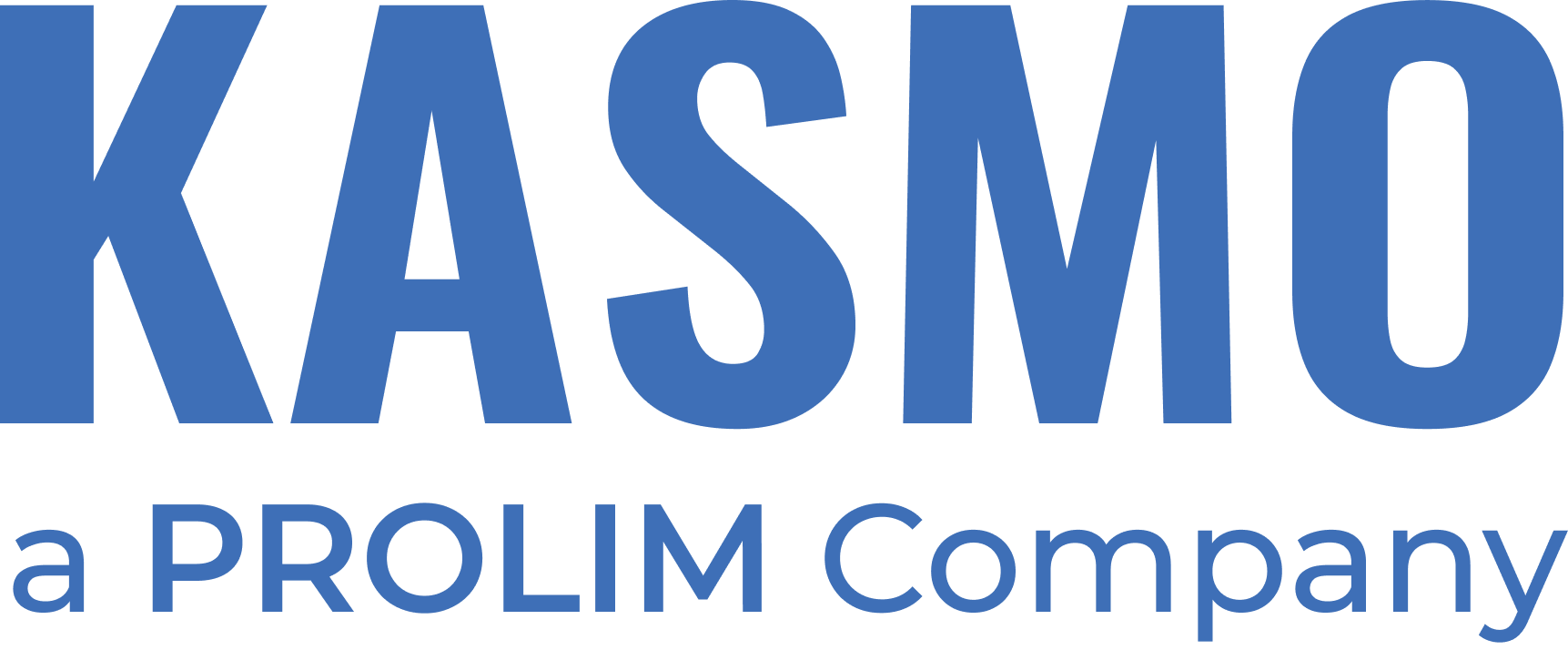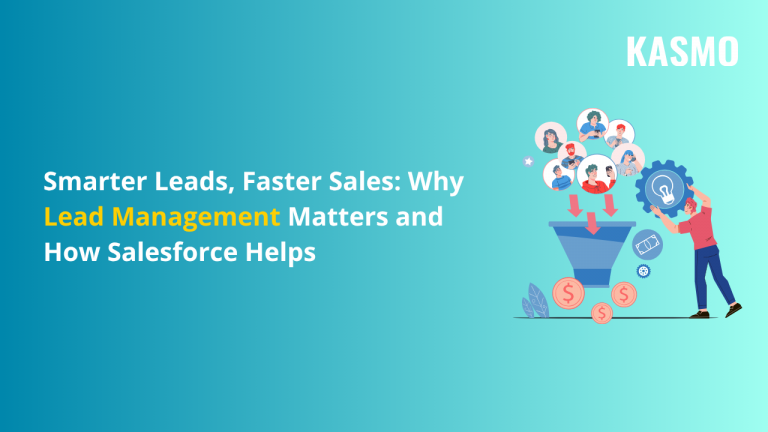Every missed lead is a missed opportunity. The difference between a lost opportunity and a closed deal increasingly depends on how well your organization manages leads. Lead management is the end-to-end process from lead capturing to conversions. When executed well, it turns marketing activity into predictable revenue. Catering to modern buyers’ needs -timely, relevant, and personalized engagement, organizations must adopt smarter lead management strategies.
An effective lead management platform includes automation, analytics, and a single customer view, and Salesforce delivers on all these. It provides a CRM-native solution that centralizes lead data, automates qualification, and provides real-time analytics. This blog defines lead management, why it matters, and how Salesforce and Kasmo solutions enable organizations to convert more leads into loyal customers.
What Is Lead Management?
Lead management refers to the continuous processes of capturing, storing, monitoring, and tracking leads throughout the customer journey with structured, targeted strategies. It enables both marketing and sales to ensure that every prospect receives the right attention at the right time. Successful lead management is about creating value, solving needs, and closing deals faster.
Lead management is also the process of managing potential customers called leads, from their very first interaction with your business, to when they eventually make a purchase. Lead management process includes several steps-
Capture Leads – This is the first stage where a business attracts customers and collects relevant details across various channels.
Qualify Leads – Understanding of the likelihood of leads to make a purchase. Include discovery calls to check whether customers need to match your ideal customer criteria.
Nurture Leads – Customers are not always ready to make a purchase. Businesses need to make efforts to engage customers with personalized communication and marketing strategies.
Distribute Leads – Assign qualified leads to sales representatives to pitch the product and do timely follow-up.
Convert Leads – Close the deal by turning qualified prospects into paying customers.
Importance of Lead Management
Effective lead management is at the core of every successful sales and marketing strategy. Without a structured approach, valuable opportunities can easily slip through the cracks. Effective lead management improves sales cycle speed, enhances customer experience, boosts sales opportunities, and sustainable revenue growth. When you identify the right leads and nurture them the way they want to be nurtured, you speed up the buyer’s journey through your pipeline.
Improper management leads to missing potential customers who are willing to make purchases. This results in lost sales and wasting time on wrong leads, which brings stress, frustration, and missed sales targets. Ultimately, effective lead management is the key to driving business growth.
Challenges in Lead Management

Identify and Engage the Right Audience
Understanding your audience enhances your marketing efforts. Not attracting the right people into the sales funnel, your marketing resources are wasted on leads that will never be converted into customers. Many businesses focus on catering to large volumes of lead generation rather than the right ones. Businesses make assumptions rather than making data-backed insights decisions. Failure to understand changing customer needs and misalignment between sales and marketing teams result in losing potential customers.
Poor Lead Quality
A primary challenge to effective lead management is treating the quantity of leads the same as the quality of leads. When sales teams become too bogged down by a high volume of low-quality leads with less ROI, this is where lead management is essential. Higher dependency on generics leads to unqualified prospects. Poor targeting strategies that emphasize the number of leads over lead quality. Effective lead management requires strong lead qualification criteria and a reliable scoring mechanism to focus efforts on high-value opportunities.
Inefficient Lead Nurturing
Companies face challenges in nurturing leads. Not every prospect is ready to buy when they enter your sales funnel. According to Gartner, “A very good conversion rate is 30% from lead-to-opportunity, which means 70% of leads contacted won’t turn into anything”. Some leads require constant engagement with personalized content, timely communication, and education about your product/service. So, lead nurturing technique is the act of building relationships across your buyer’s journey and convincing them to become your loyal customers. Organizations follow one-size-fits-all emails that do not engage prospects from multiple stages, and the lack of tracking leads to missed opportunities and sales.
Misalignment Between Sales and Marketing
A main issue in lead management is poor connectivity and collaboration between sales and marketing teams. Marketing teams may generate leads that sales teams might feel unqualified for. The sales team would not follow up on them, decreasing the chance of conversions. This mismatch in goals, processes, and communication between the two departments leads to poor lead quality, inconsistent customer experiences, and ultimately, lost revenue.
Inconsistent Follow-Ups
Follow-up is critical in lead management for most functions. Several times, companies are too slow to follow up. This could be due to the manual process, prioritization among interested leads, or a lack of automation to enable speedier responses in follow-up. Either way, it’s important to consider the risk involved when you delay getting back to a customer.
How Does Salesforce Help in Effective Lead Management?
Salesforce’s lead management functionality is a feature available with the Sales Cloud, which includes CRM and sales automation products for sales teams. Salesforce’s lead management provides efficient solutions for revenue teams to engage with potential customers. It enables businesses to prioritize high-value leads, quickly assign leads to the right sales team members, and nurture potential customers through the sales cycle. This, in turn, decreases delays and bottlenecks and speeds up the sales process and deals.
Salesforce provides a 360-degree unified view of leads with information centralized in one place. The sales team has a complete view of customer intent, preferences, and history. Einstein AI analyzes historical data and customer behavior to score and rank leads based on their likelihood to convert. With proper lead management, teams can focus on the most valuable prospects, giving them personalized experiences leading to higher conversion rates and happier customers. Further, Salesforce empowers revenue teams to develop insights, analyze performance, and identify trends to better inform sales, ultimately improving sales processes and helping to scale businesses.
LeadFlow Agent – Kasmo’s AI-driven Lead Management Solution
Sales agents often handle several tasks like managing leads, meeting revenue goals, and achieving sales targets. Also, lead management is a challenging task; it requires consistent prospecting, nurturing, and closing deals. This complexity highlights the importance of effective sales management tools. Kasmo’s LeadFlow Agent, powered by AI and built on Salesforce, addresses all the lead management challenges as a personal digital assistant for every sales agent. This solution is carefully designed to support the sales team, to plan, guide, and automate the sales agent’s daily workflow, and to enhance productivity and efficiency.
How LeadFlow Agent Helps Sales Teams

Regular follow-ups
AI Agent intelligently organizes the sales agent’s schedule, prioritizes tasks, and sets up follow-ups, so that no opportunity is missed. By removing bottlenecks in scheduling, qualification, and follow-up, sales representatives can accelerate the transition from lead capture to opportunity creation, resulting in faster sales.
Meeting Management
Integrated with Agentforce, LeadFlow Agent automatically pulls in schedules, contextual notes, and meeting transcripts. Sales representatives can save up to 50% of their post-call administrative time with automated Minutes of Meeting (MoMs), including key decisions, next steps, and assigning responsibilities. This saves valuable time and leads to lead nurturing and deal closure.
AI-driven Insights
It assists sales agents with AI-driven insights to qualify leads faster and move them smoothly into opportunities. AI-guided qualification ensures leads are scored and prioritized based on potential value, while timely follow-up reminders boost engagement and increase the probability of conversion.
Improves Productivity
Structured planning, automation of routine tasks, and guided customer insights empower sales representatives to work smarter. This end-to-end support allows sales teams to spend less time on manual tasks and more time delivering personalized engagement to prospects.
Conclusion
Effective lead management is a strategic capability that directly impacts growth, efficiency, and customer experience. Beyond immediate revenue gains, advanced lead management increases collaboration between sales and marketing teams and produces higher conversion rates. When powered by unified platforms like Salesforce, lead management becomes easier and drives sales excellence.
Together, Salesforce and Kasmo’s LeadFlow Agent provide AI-driven insights, enabling revenue teams to capture, qualify, and convert leads more efficiently. LeadFlow Agent enhances teams’ productivity by automating routine tasks, guiding follow-ups, and generating instant post-meeting summaries. With streamlined lead-to-opportunity journeys and higher conversion rates, organizations can drive sales excellence and success.




